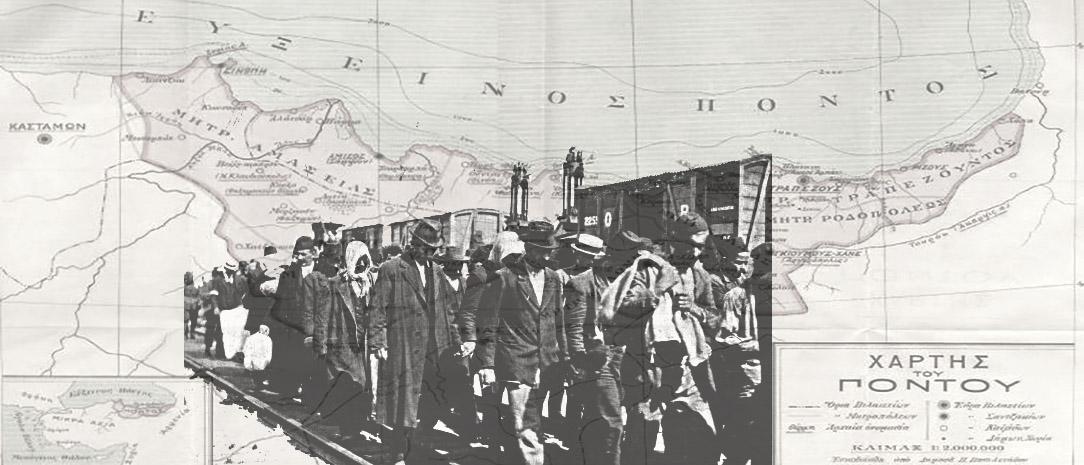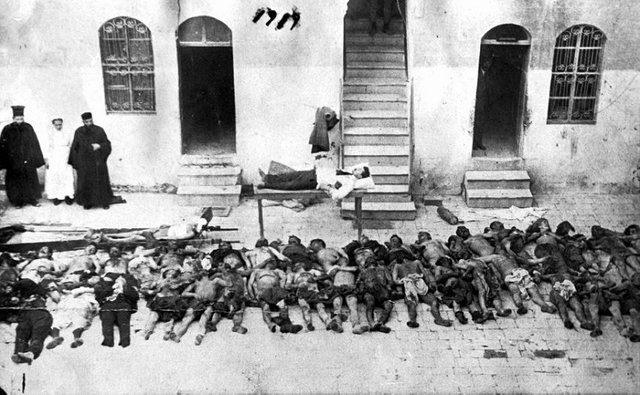We remember the Greek Pontian Genocide

Before the term "Genocide" there was the term "Crimes against Humanity". Genocide as a term was mainly formulated in the Nuremberg trial in 1945, where the leadership of the Nazi war criminals was tried.
In particular, the term means the methodical extermination, in whole or in part, of a national, racial or religious group. This is a primary crime, which is not a function of war conflicts.
The genocide does not kill a group for something they did, but for something they are. In the case of the Greeks of the Pontus, because they were Greeks and Christians.

In 1915, it was a landmark year for Pontian Hellenism in Asia Minor. During that year, and while all European states were involved in the First World War, the Turks elaborated a plan to exterminate the Christian populations of Asia Minor. Exile and the massacre of the Armenians took place in June, and the first acts of violence against the pontian element began. In December 1916, the generals Ervur and Talajat prepared a plan for the extermination of the civilian Greek population of Pontus, which envisaged "Immediate extermination of men from cities from 16 to 60 years and general exile of all men and women of the villages to the inland of the East with Slaughter and extermination program ".
The program began 15 days later and was mainly applied in the areas of Samsun and Pafra. The area of Trebizond had escaped from the turmoil of the Turks because it was occupied in April 1916 by the Russian army. But when the Russians left the city in February 1918, then half of the population of the region abandoned its homes and followed the Russian army when it retreated. Most of the refugees settled in the Caucasus and Georgian beaches.
The Pontians believed that the end of the First World War would bring a definitive end to their plight, but they were denied ...
Their appeals for inclusion in the Greek state were not heard by Eleftherios Venizelos, who considered Pontos to be far removed from the rest of the Greek regions, making it impossible for him to defend himself from the Turkish raids. In return, he proposed that the Pontians advance the creation of a federation with the Armenians, and indeed the Archbishop of Trebizond Chrysanthos Philippidis and the Armenian President Alexander Khastyan signed an agreement in January 1920 on the creation of a submarine state. But in November 1920, the Armenian army was defeated in Erzurum by the Kemal forces, with the result that the Armenians capitulated and the Pontians remained alone. From then until August 1922, Kemal, having cleared the minor fronts in Asia Minor, proceeded undisturbed to the gradual extermination of Pontian Hellenism. Cities and villages were burned, the villagers were slaughtered, dishonored, exiled, or fleeing together in forests and mountains. Those men captured were promoted within Asia Minor. It is estimated that between 1914-1922 about 200,000 Pontians were killed.
The Turks exiled and exiled the Greeks into the heaviest weather, without allowing them to receive food or mattresses. The governmental bodies accompanying the displaced did not allow their victims to park in inhabited places, but only in parts scattered and exposed to winter conditions. The purpose was double: first they can not be housed and then they can not buy food. They did not allow for any reason to help older parents or minors and the sick, who abandoned the gorges and forests and died of hunger or were made up of the spear of the Turks. In several parts of the country baths were allegedly built for military reasons. The government and police bodies that led the displaced people were forcing the unfortunate for allegedly hygienic reasons to bathe. They put hundreds of men, women and children in the baths, naked, with a temperature of 40 degrees. The garments of the unhappy were plundered. When they came out of the bathroom, they forced them to lie down in the snow and below zero and wait for the police to visit for counting, who never arrived an hour ago. Then another hour they waited for a medical checkup.

During the inspection, the younger and healthier were killed, who were killed when sent to the hospital.
From the outbreak of the First World War (1914) to the Asia Minor Catastrophe (1922), the young Turks took the hard measures they had taken against the Greeks of the Pontus by the method of exile, rape, slaughter, extermination and hanging (according to Panaretos Topalidis ) Killed:
A. During the period 1914-1918 170.576 Pontians
B. In the period 1918-1922 119,122 Pontius
A total of 289,698 Ponies
A percentage of 41.56% of a total of 697,000 Greek inhabitants, while according to G. Valavanis, the Pontians' losses according to the Black Book of the Pontian Central Council in Athens amounted to 303,238 to 1922 and 353,000 to March 1924, Which exceeds 50% of the total population of the Greeks of Pontus.
19th of May 2017 Syntagma Square in Athens
images credit: inet digital archives